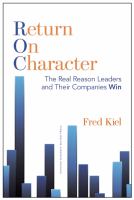Book Review: Return on Character
Kiel, Fred. Return on Character : the real reason leaders and their companies win. Harvard Business Review Press, 2015.
 In June, Fuqua faculty published their recommendations for summer reading, an eclectic list of 36 classic books and current bestsellers, as diverse as are the members of our faculty. One book on the list was not yet available at Duke libraries, Return on Character by Fred Kiel. At first, I thought this recommendation was a mistake because a similar title, Road to Character by David Brooks, was a runaway best seller. But Kiel’s book was an intentional choice by Assoc. Dean Shane Dikolli.
In June, Fuqua faculty published their recommendations for summer reading, an eclectic list of 36 classic books and current bestsellers, as diverse as are the members of our faculty. One book on the list was not yet available at Duke libraries, Return on Character by Fred Kiel. At first, I thought this recommendation was a mistake because a similar title, Road to Character by David Brooks, was a runaway best seller. But Kiel’s book was an intentional choice by Assoc. Dean Shane Dikolli.
Former practicing psychologist and current advisor to executive leaders, Fred Kiel wrote Return on Character to chart the connections between strong character, principled behavior and sustainable business results. In 2006, he began a research project involving 212 CEO’s, interviewing and surveying the leaders and the people who worked for them. These results were compared to the financial performances of their businesses.
After 7 years of research, Kiel concludes that CEO character matters — there is a consistent relationship between character driven leaders and better business results. In addition, he finds that an individual can develop his/her character well into adulthood. For leaders who want to improve their character, Kiel recommends practicing the habits that shape character. These habits include always telling the truth, no matter how difficult; accepting and forgiving mistakes; and helping others to thrive. Developing habits like these causes profound personal change over time.
Kiel outlines his 6-step program for personal growth and change for individuals and goes on to explain how to infuse character attributes like integrity and compassion throughout an organization. Yet skeptical readers may doubt that egotistical CEOs want to change their self-focused values. It is also unlikely that most people can get to the root of their character “in a few weeks” using the brief tools outlined in chapter 7. Even the most motivated individuals may require therapy or expert coaching to overcome pride and self-deception, to ultimately gain the personal insight needed for change at the deepest level.
Nonetheless, Kiel’s guide to inner growth would benefit anyone aspiring to give his/her best at work and to leave the world a better place, especially corporate and nonprofit leaders, who are exceptionally influential at work and within the larger world. The qualities that Kiel identifies — integrity, responsibility, compassion and forgiveness — are important for leaders at all levels of organizations. Recommended.
© Meg Trauner & Ford Library – Fuqua School of Business.
All rights reserved.